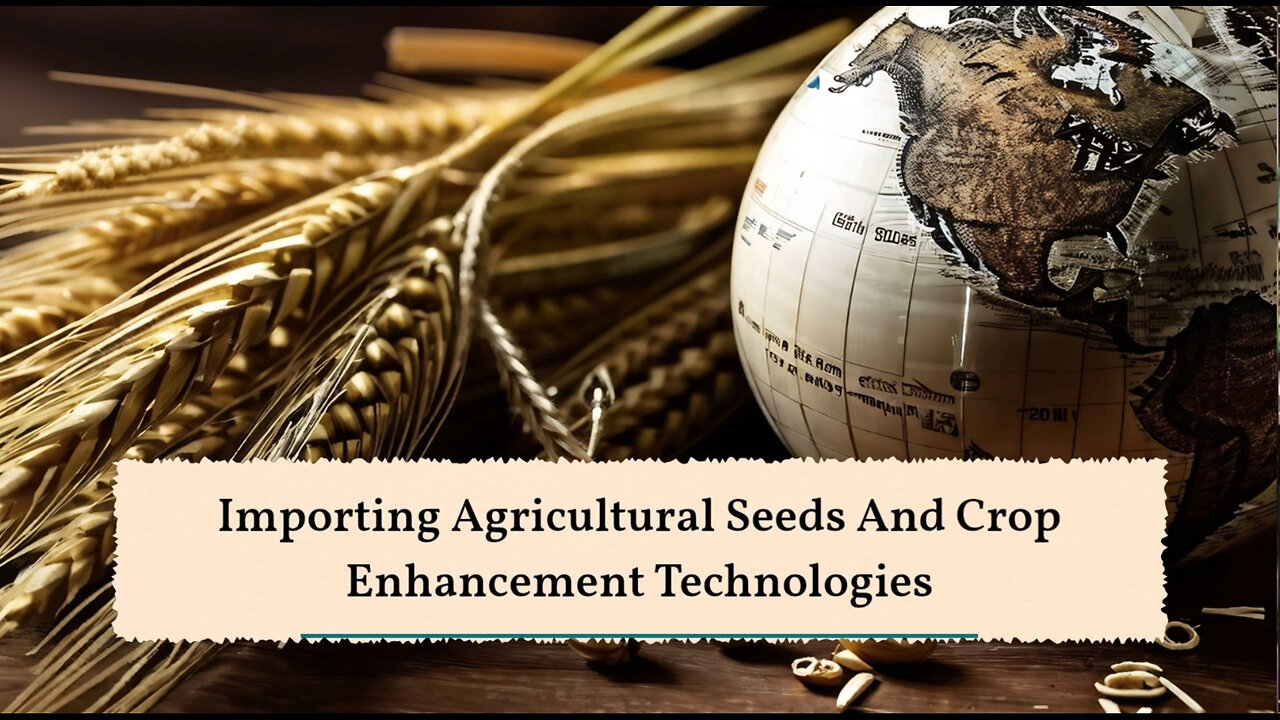Premium Only Content

Maximizing Crop Yields: A Guide to Importing Agricultural Seeds and Technologies
ISF Customs Broker
800-710-1559
[email protected]
https://isfcustomsbroker.com
This video episode deep-dives into the topic of importing agricultural seeds and crop enhancement technologies. It emphasizes the importance of working with a customs brokerage service that specializes in agricultural imports. The video explains how customs brokers assist importers in complying with customs regulations and requirements regarding the Importer Security Filing (ISF) and customs bond. It highlights the need to understand specific regulations and restrictions, such as phytosanitary certificates and labeling requirements, and recommends conducting thorough testing and research before importing. The video concludes by summarizing the key points and encouraging viewers to stay tuned for more customs brokerage-related topics in future episodes.
#usimportbond #isfcustomsbroker #uscustomsclearing #isfentry
Video Disclaimer Here: This video is for educational purposes only and we are not affiliated with any US government agencies/companies/individual/etc.
00:48 - Importance of Customs Brokers: Engaging a customs brokerage service that specializes in agricultural imports is crucial for navigating customs regulations and ensuring smooth import processes for agricultural seeds and crop enhancement technologies.
01:03 - Compliance Requirements: Importers must adhere to the Importer Security Filing (ISF) requirements, submitting necessary cargo information to U.S. Customs and Border Protection (CBP) at least 24 hours before vessel departure to avoid penalties and delays.
01:40 - Customs Bonds and Regulations: Obtaining a customs bond is essential for financial compliance with customs regulations. Importers must also understand specific regulations regarding phytosanitary certificates and labeling to ensure successful importation.
02:41 - Testing and Research: Prior to importing, it is advisable to conduct thorough testing of seed quality and viability, as well as research on crop enhancement technologies to minimize risks of crop failure or contamination.
-
 1:03:22
1:03:22
TheCrucible
2 hours agoThe Extravaganza! EP: 61 with Guest Co-Host: Rob Noerr (10/28/25)
47.3K4 -
 LIVE
LIVE
Nikko Ortiz
3 hours agoBATTLEFIELD 6 NEW BATTLE ROYAL REDSEC... |Rumble Live
64 watching -
 LIVE
LIVE
StoneMountain64
9 hours agoBattlefield REDSEC Battle Royale GAMEPLAY & 1st Impressions (Free to Play LAUNCH DAY)
202 watching -
 1:33:39
1:33:39
Michael Franzese
2 hours agoThe Real Donnie Brasco: REVEALS Why Joe Pistone Stole His Name
14.2K1 -
 1:12:46
1:12:46
Candace Show Podcast
2 hours agoCharlie Ripped A Hole In Reality | Candace Ep 253
35.1K63 -
 UPCOMING
UPCOMING
Tundra Tactical
3 hours agoProfessional Gun Nerd Plays Battlefield 6
131 -
 LIVE
LIVE
NAG Daily
22 minutes agoBOLDCHAT: with ANGELA BELCAMINO
23 watching -
 LIVE
LIVE
Blabs Games
7 hours agoFirst Time Playing Jurassic World Evolution 3
95 watching -
 LIVE
LIVE
The Rabble Wrangler
19 hours agoBattlefield 6 - RedSec with The Best in the West
76 watching -
 LIVE
LIVE
Viss
9 hours ago🔴LIVE - BF6 Battle Royale Launch: RedSec w/ Viss, Dr Disrespect, BobbyPoff, Rallied
104 watching